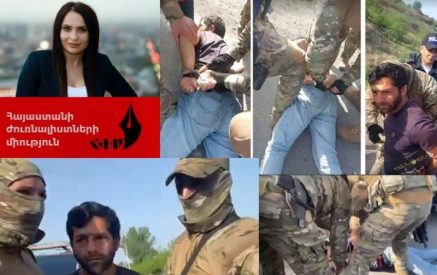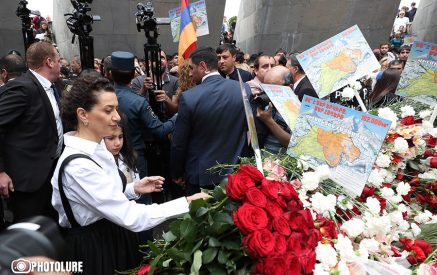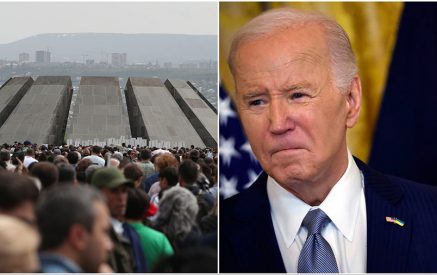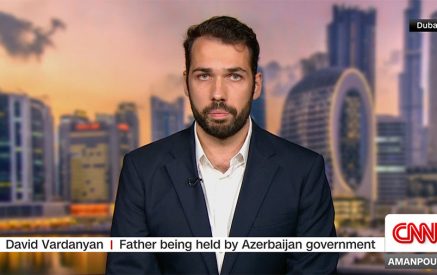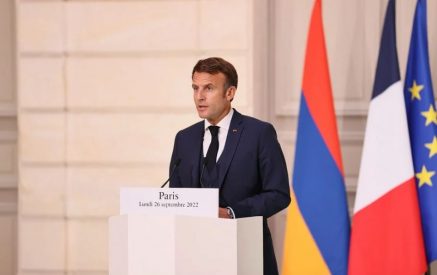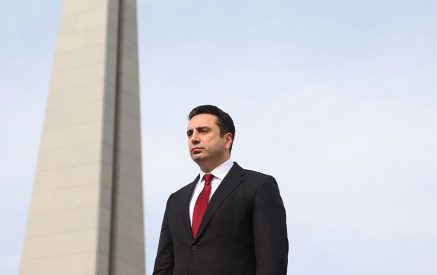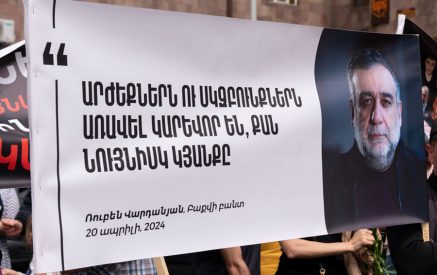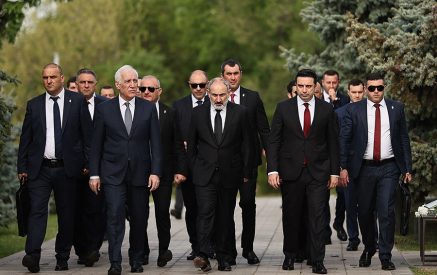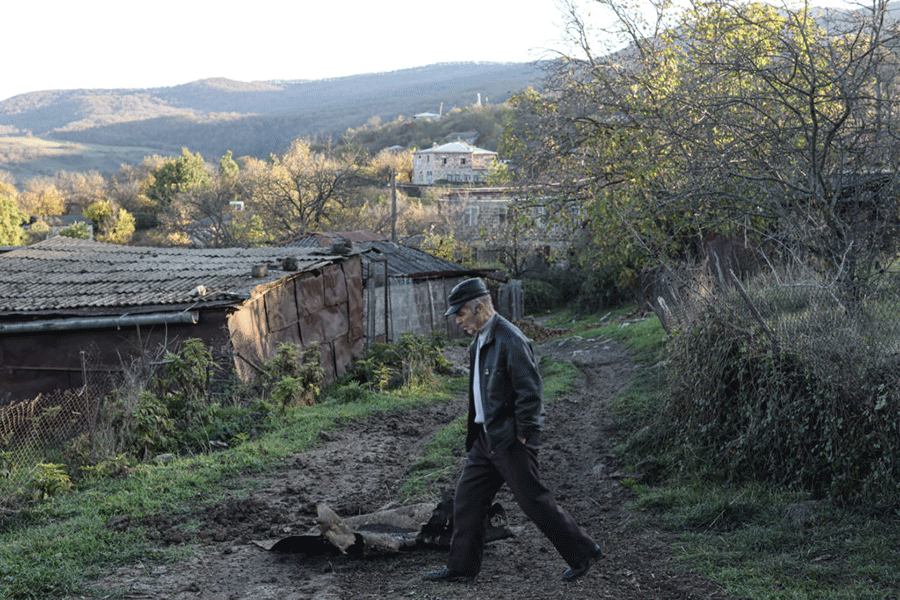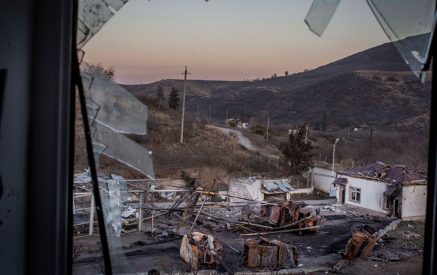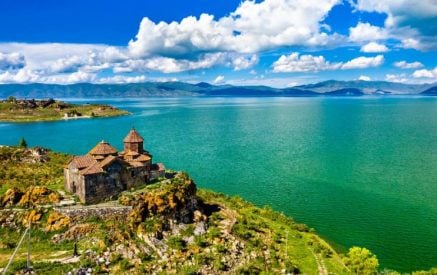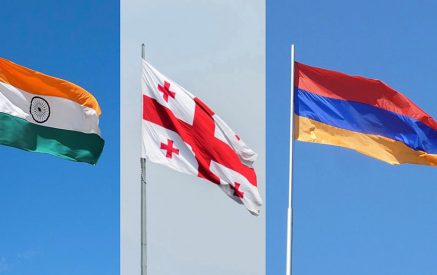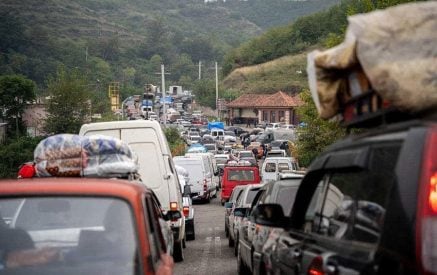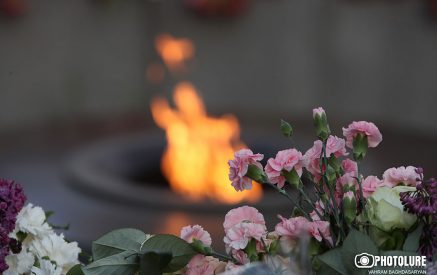by Stepan Piligian
During our time on this earth, there are experiences in service to others that are worthy of our commitment. I would define them as our Lord, our family and our nation. The first is defined as establishing a relationship through Jesus Christ that gives meaning to our lives and encourages us to serve others as we prepare for eternity. Our families are the gift God has given us to live our earthly lives. We are brought into this world with parents, we evolve into becoming parents and with His grace become grandparents. Along the way, we are blessed with a multitude of people we call family. It gives us joy, and at times challenges, but always an identity.
The last area is the most “earthly” of our service areas. We often refer to a nation as the umbrella for those of a common culture, ethnicity or religion. For stateless people, it can be a global concept; for nations with a diaspora, it takes on a territorial and global existence. In the long and tumultuous history of the Armenians, we have experienced almost every version of nationhood. Armenia existed for centuries as a nation governed by a monarchy or feudal states. Armenia has also experienced substantial time as a subjugated nation existing within a larger multi-nation state, such as an empire. In recent centuries, democracies have emerged where a representative government elected by its citizens is the public face of the nation. Armenia has had two such experiences in the last 100 years and is now in the 32nd year of the current republic. Whether a monarchy or a democratic republic, they were sovereign states.
Read also
For independent and free nations, the term sovereignty is frequently associated with the freedom of a nation state. It generally refers to the ability of a state to self-govern, define its territory and attend to its own matters. Sovereignty is usually earned through military conflicts, such as the United States Revolutionary War that started in 1775, or as a result of the collapse of a previous subjugating power, such as the Soviet Union. It was the latter that enabled the creation of the current Republic of Armenia. In either circumstance, it occurs through the sacrifice of many, and therefore is usually vigorously defended when under threaten. There are circumstances where nations defend their sovereignty because they have lived through the alternative: oppression. Such is the case of Artsakh. I have often felt that because Armenia and Artsakh secured their sovereignty in different manners, their intensity in defending sovereignty differs. Certainly, there are many citizens of Armenia who understand the fragility of sovereignty, but there are also many who are removed from the crisis. Walking through the streets of Yerevan is a significant contrast to Berdzor or Stepanakert.
Given the diversity of our global Armenian nation, it is natural that there are varying perspectives on its impact and the level of commitment to be invested. Some are willing to sacrifice freedom in exchange for stability. I will always remember an incident I experienced in 2011 in Armenia. We were touring the museum in Sardarabad, which is the symbol of sacrifice and sovereignty for Armenians. Sardarabad in 1918 was when Armenians collectively drew a line in the sand and declared their intention to stop the Turkish genocidal advance or perish in the process. They were unwilling to accept subjugation and further atrocities. The Catholicos in Holy Etchmiadzin was encouraged to evacuate given the advance of the Turkish armies from the west and northwest. He refused by stating that if we cannot defend our land, then he will die there. During our tour, we were led by a very articulate woman who took us through the main exhibits and the special exhibits from the revolutionary period of 1915-20. During the course of our conversation, I expressed my joy about the establishment of an independent and sovereign Armenian state. Her response was shocking. She stated that her strong preference was to return to the “old days”… a not-so-subtle reference to the Soviet era. Her reasoning was that stability and employment were more important than sovereignty. She was unwilling to commit to the challenges of the democratization of Armenia and its transition to a market economy. She advocated a perspective where the price of sovereignty was too high.
The western diaspora generally expresses strong feelings in support of the independence and self-governing of Armenia. I believe we can attribute this to two factors. The obvious one is that we all are usually a product of our environments, and most Armenians in the Americas and Europe were raised in democracies. It is natural for us to champion those principles for the homeland. It is interesting to note that a sovereign nation is not necessarily a democratic one, but in modern times we tend to package them together. A sovereign nation has the freedom of self-governing, while democracy is one system of self governance. In the past, monarchies were sovereign but hardly democratic. The other reason for this approach in the diaspora has to do with the patriotic feeling sustained over the decades that has contributed to our identity. When thousands of Armenians in the diaspora have a picture of Ararat on their walls, it represents the dream of a united and sovereign nation.
The fervor over the unpunished crime of genocide is manifested in reparations of territory and financial compensation for the atrocities committed. The question remains, however: What is the level of credibility of the diaspora towards Armenia’s sovereignty? They don’t live there and those with part-time residences are perceived as an Armenian version of “snowbirds” in Florida. There are those who have received Armenian dual citizenship, but the vast majority of the diaspora expresses its views from a distance. Many Armenians in the homeland appreciate the patriotic expression and support from the diaspora but recognize the limitations of their impact. In the thirty-plus years of Armenia’s sovereignty, we have collectively failed to define the integration of all those who care for Armenia – both in the homeland and the diaspora.
Within Armenia, one can gain vastly different perspectives from urban dwellers in Yerevan versus the border village residents. When you live on the border facing those who are committed to your destruction, you gain a very fundamental perspective on freedom and sovereignty. It is about the land that generations have lived on. It represents one of the most apolitical forms of patriotism. For these people, the sacrifice index is high because it represents their way of life. Our brethren in Artsakh represent the purest understanding of the price of sovereignty. After the 2020 war, there was no mass migration out of Artsakh.
The vast majority of the approximately 45,000 displaced during the war returned to Artsakh. They are strong, resilient and inspiring. Their perspective on sovereignty is about the quality of their lives. It is not an academic discussion. It is a challenge every day.
Armenia and Artsakh have a crisis of sovereignty today. We all understand the risks to Artsakh, but Armenia’s border security represents an equal risk. In my view, we cannot negotiate for sovereignty. If Armenia exists with a foreign presence, no foreign policy, economic dependency and porous borders, its sovereignty will be lost. It will be a vassal state. Perhaps this is what Armenians want – a big brother protector that will manipulate its future. If Armenia wants sovereignty, it must understand that it cannot be won through appeasement. Sacrificing Artsakh will not quench the thirst of the Turkish alliance with its pan-Turkic revivalism. Yes, we need friends we can count on, but in parallel we need to demonstrate our resolve. Mixed messages from various Armenian quarters does not enable that objective. Bold moves are needed to optimize our resources and prevent confusion.
The Armenian government should declare a national political amnesty and build a unity government. A small nation divided in a dangerous neighborhood must avoid internal conflict. The church, as the most important non-governmental institution, should be visible and vocal to advocate for our people. We need more activities like the reported efforts of Archbishop Bagrat, Primate in Tavush. The “security and rights” plan for Artsakh needs details and must be a red line. Currently it feels like no one is listening. Aliyev’s strategy is simple and predictable. Satisfy the diplomatic community in the West with lies and apply military pressure when he doesn’t get his way. Now he is attempting to collude with Russia over the “Zangezur” violation of Armenian sovereignty. Our recovery starts with a unified Armenia (plenty of room for improvement) and positions that display strength and a defense of our sovereignty. Allowing Aliyev to find a map that adds credence to his incursions into Armenia should be met with firm resistance.
Before we offer any compromise, remember two things: Aliyev will not change his aggression with concessions, and the West wants a “peace deal” regardless of the impact on Armenia. Their tolerance of the criminal behavior of Aliyev is all you need to know. They are pushing the “deal” ahead of any compromise from Aliyev because their objective is to weaken Russia and not necessarily provide any security for Armenia. This peace process is playing with the sovereignty of Armenia. If the result of this process redefines the border of Armenia with territorial losses, allows a corridor that cuts off Syunik (the real goal of Aliyev) and ignores the rights of our brethren in Artsakh, we have not only failed but have lost our sovereignty. The price for our sovereignty is high. It always has been. Think about the patriots gathered for a blessing at Holy Etchmiadzin before Sardarabad. I think they understood the price. Vartan and Ghevont Yeretz understood the price. Our inspiring people in Artsakh clearly understand it too. My father used to say that nothing of value happens without sacrifice. That sacrifice may not be loss of life, but also financial and other forms of commitment. It may also mean that we subordinate our egos, forgive and stand together. Is that a price we are willing to pay?


